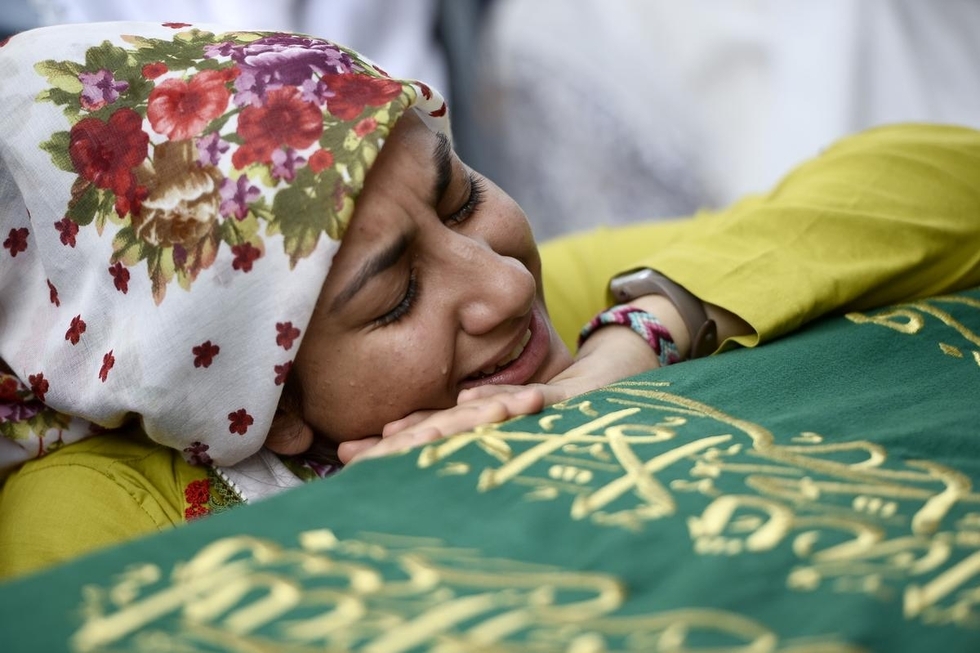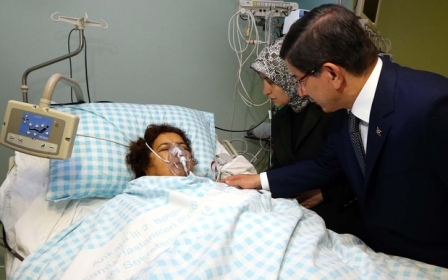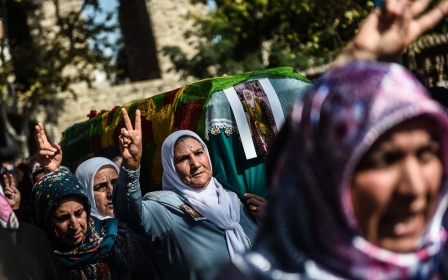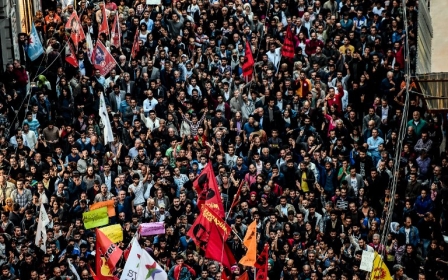Turkey: After the Ankara massacre

The deaths of more than 100 left-wing peace demonstrators early on Saturday morning in the heart of Ankara has convulsed Turkey like no other event in its recent history, bringing demonstrators out onto the streets not only in Ankara and Istanbul but in other towns across the country.
There appear to have been two suicide bombers, both male, working some distance apart and timing their detonations so that there was a stampede towards the second bomber and the maximum number of killings. They also concentrated on those sections of the crowd where supporters of the HDP, the left-of-centre, Kurdish-rooted, People’s Democratic Party were most numerous. Like the Suruc massacre which killed 34 people on 20 July in southeastern Turkey, the attack was focused on Kurdish groups and their leftwing Turkish allies.
Since the explosions, Turkish politicians have been at loggerheads with competing claims about who was responsible. Turkey’s EU Affairs Minister, Beril Dedeoglu, aroused derision by suggesting that the PKK - the Kurdistan Workers Party, the guerrilla movement responsible for much of the violence in Turkey over the last two months - and ISIL, despite being sworn enemies, might have joined forces.
There were equally absurd suggestions that the Gulen movement, a US-based Sufi brotherhood at odds with the Turkish government might be responsible. And one Turkish cabinet minister said that the HDP might be bombing its own meetings to gain sympathy.
Against this background, it is not surprising that despite calls for cooperation and unity on all sides, Turkish public opinion is angry and polarised - and also fearful of what could happen in the 20 days until the 1 November general elections. There is particular exasperation among opposition groups that the government continues to point the finger at the HDP, the main victim of this and a string of earlier attacks including the ransacking and burning of its party offices, rather than try to work together with it. The HDP was excluded from the offer of dialogue which the prime minister, Ahmet Davutoglu, extended to the other two opposition parties after the bombing.
HDP leader Selahattin Demirtas’s own personal safety ought to be an overriding national priority at the moment, but there are no signs that this idea is widely accepted in official circles. Indeed the government seems completely indifferent to his repeated warnings that, given the violent pressures it faces, the HDP cannot hold an election campaign and Demirtas announced on Monday that as a result the HDP would not hold any elections rallies.
All this does not seem to have affected its following: every opinion poll shows the party easily hanging on to most of the six million votes it collected from Kurds and liberal Turks in June.
Under these circumstances, it might have seemed a more profitable electoral strategy for the AKP to widen its voter base by moderating its criticism and respect the fact that Demirtas has roundly condemned violence on many occasions, and indeed he and his party until last spring worked closely with the government on the peace process. The strategy of ever greater confrontation seems to be the product of advice from Yalcın Akdogan, now deputy prime minister and, since August of last year, the principal strategist on Kurdish policy.
Meanwhile police investigations seem to be confirming what most unofficial Turkish observers assumed immediately after the bombing: an attack was staged by the Turkish/Kurdish section of IS and closely linked to two earlier attacks on the HDP, the Suruc bombing in July, and the bombing of the HDP rally in Diyarbakir two days before the 7 June elections.
There is a large and unexplained overlap between the three bombings. The Suruc and Diyarbakir bombers came from the same town, had both been trained by IS, and knew each other. It has still not been explained why the Diyarbakir bomber was released by police a day before he attacked the rally. There are now initial reports, so far unconfirmed, that one of the Ankara bombers was the brother of the Suruc bomber.
At any rate, it looks likely that there was some kind of an ISIL network operating. The failure over four months to investigate it and expose any possible links to junior levels of the administration is puzzling. Shortly after the Ankara explosion, Selami Aktinok, the interim minister of the interior and a career policeman, denied that there had been any security lapses. Many citizens of Ankara found it ironic that the day after the explosion, police stopped citizens leaving carnations at its site on security grounds. “Where were you yesterday?” they asked
The failure to probe ISIL deeply enough contrasts starkly with a string of intelligence successes against the PKK during September, including the discovery of hideouts and weapons and explosives.
The priority now, however, is not simply to remedy these defects. It is to create a mood of national confidence that the general election campaign can proceed securely. Huge rallies attended by tens of thousands of people are a standard feature of these campaigns in Turkey. Security at the massive meetings organised by the AKP seems invariably tight and effective. But all opposition leaders deserve similar flawless security. At the weekend, Turkey’s main opposition leader, Kemal Kilicdaroglu of the Republican Peoples Party (CHP) was told by a hostile journalist: “you will die too”.
The insecurity, fear and defiance felt by the opposition was expressed eloquently by Demirtas on 11 October in off-the-cuff remarks to camera translated into English and published on the Internet. They included a very strong personal attack on Ahmet Davutoglu, pointing out that the 30-minute long television speech by the prime minister after the bombing had consisted of 20 minutes of verbal offensive against Demirtas.
Whoever was responsible for the breakdown of civility in Turkish national politics hardly matters now. The point is to break the cycle of violence before it claims further lives. The murdered demonstrators in Ankara were demonstrating, they said, for peace. There has been a response from the PKK which says it has declared a ceasefire out of respect for the dead. This may or may not be sincere, but it has been completely ignored by the government.
Yet unless the government takes the lead in not attacking its opponents, but trying to reach a working compromise with all of them, more violence seems inevitable and the architects of Saturday’s massacre will benefit.
- David Barchard has worked in Turkey as a journalist, consultant, and university teacher. He writes regularly on Turkish society, politics, and history, and is currently finishing a book on the Ottoman Empire in the 19th century.
The views expressed in this article belong to the author and do not necessarily reflect the editorial policy of Middle East Eye.
Photo: A relative of Fatma Esen, who lost her life in Ankara train station bombings, cries near her coffin during a funeral ceremony at Gazi Cemetery in the Fatih district of Istanbul, Turkey on 12 October, 2015. (AA)
New MEE newsletter: Jerusalem Dispatch
Sign up to get the latest insights and analysis on Israel-Palestine, alongside Turkey Unpacked and other MEE newsletters
Middle East Eye delivers independent and unrivalled coverage and analysis of the Middle East, North Africa and beyond. To learn more about republishing this content and the associated fees, please fill out this form. More about MEE can be found here.





